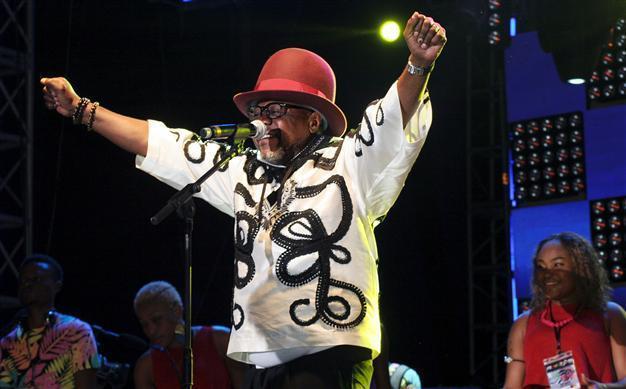'King of Congolese rumba' Papa Wemba dies
ABIDJAN - Agence France-Presse

AFP photo
Papa Wemba, one of Africa's greatest music stars, died on April 24 after collapsing on stage during a festival in the Ivory Coast, the event organisers said.
Papa Wemba, renowned as the "king of Congolese rumba" for the fusion of Cuban and electronic rock that he pioneered in the 1970s, was 66.
The flamboyant world music singer died after collapsing during a set in the early hours of Sunday at the Urban Musical Festival Anoumabo (FEMUA) in Abidjan.
Video footage broadcast live on television showed the dramatic moment that Papa Wemba -- wearing a bold black and white patterned tunic and oversized bowler hat, slumped to the floor behind a group of dancers, before performers rushed to his aid.
The FEMUA management expressed its "deep sorrow" at the death of a man who has been at the forefront of African music for more than four decades.
The festival was the first major cultural event in Ivory Coast since the Islamist attack on the beach resort of Grand-Bassam last month that left 19 people dead.
Papa Wemba won international acclaim when the fashion for African and world music took hold in Europe and the United States in the 1980s, and recorded with British rock star Peter Gabriel.
"He was an icon, an artist of talent... it's a great loss for music," Democratic Republic of Congo Culture Minister Banza Mukalay told AFP.
The father-of-six was also known as the driving spirit behind a cult movement known as "Sapeurs" whose members -- young men -- spend huge amounts of money on designer clothes.
However, he was convicted in France in 2004 for smuggling illegal immigrants into the country.
Papa Wemba was born Jules Shungu Wembadio Pene Kikumba in June 1949 in what was then Belgian Congo, now the DRC.
He began his singing career in religious choirs in which he developed his trademark high range voice, making his debut in the capital Kinshasa at the end of the 1960s.
He inherited his love of song from his mother, who was a professional "wailing woman" at funerals.
Like many of his generation he was strongly influenced by American and British pop culture and initially took the stage name Jules Presley.
In 1969 he helped found Zaiko Langa Langa, a Zaire-based pop group that was to achieve cult status in the 1970s with its revival of Latin American rumba.
The group revitalised the style that had been popular in the 1940s, using a combination of Afro-Cuban rhythm and Congolese song while introducing rock rhythms and electronic sounds.
Papa Wemba settled in France in 1986 as his fame began to reach as far afield as Japan, dazzled by the African dandy who was dressed by the world's leading designers.
He went on to reach a much wider public thanks to a world music album produced by France's Martin Meissonnier in 1988, which blended African and Western sounds.
Papa Wemba parted ways in 1999 with the Real World record label founded by Gabriel, the former Genesis singer.
But he remained immensely popular in Africa, taking part in major music events including a concert in London for Nelson Mandela's 90th birthday.
He was convicted by a Paris court in 2004 of smuggling illegal immigrants into France by disguising them as members of his band but walked free as he had already served four months behind bars.
